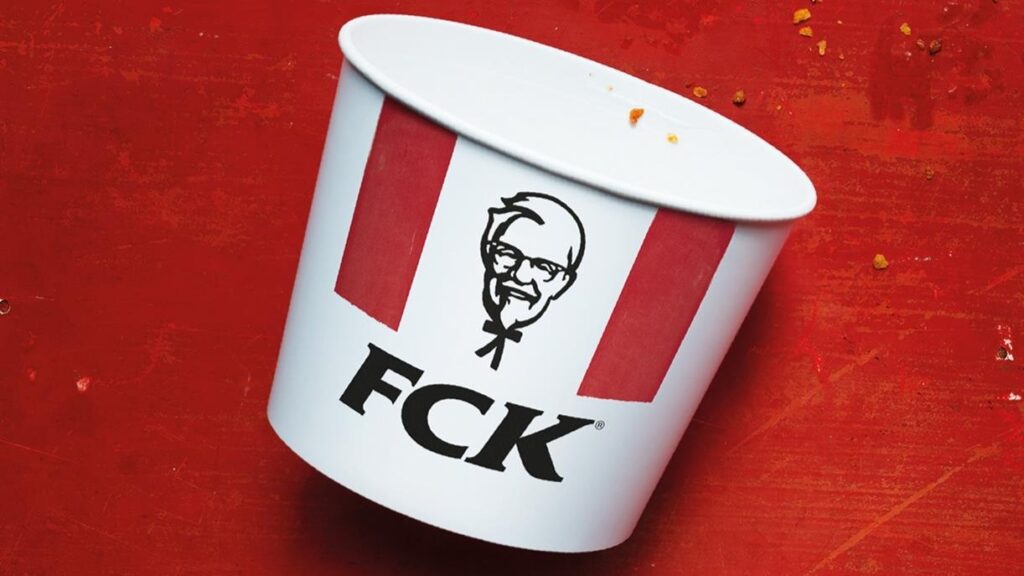Let’s rewind to February 2018. The air in the UK was usually buzzing with the aroma of fried chicken. But something was… off. For millions of Brits, their beloved KFC, that comfort food staple, was suddenly, shockingly, out of chicken. Imagine the horror! Hundreds of restaurants shut down, customers were bewildered, and social media, as it always does, erupted.
You might be thinking, “A chicken shortage? Really? How bad could that be?”
Well, try telling that to someone craving their Zinger meal after a long day, only to find their local KFC dark and deserted. It was, frankly, a bit of a cluck-up.

The Unthinkable Happens
This wasn’t some minor hiccup. It was a crisis of epic proportions for a brand built on serving fried chicken. The problem? A switch in delivery partners. KFC had moved from Bidvest Logistics to DHL, aiming for efficiency. What they got instead was a logistical nightmare. Mismanagement, miscommunication, and simply not enough drivers led to fresh chicken being stranded in depots, unable to reach the restaurants.
The consequences were immediate and dramatic. Over 700 of KFC’s 900 UK and Ireland stores were forced to close their doors. For a brand that relies on consistent product availability, this was a body blow. The internet, predictably, had a field day. Memes proliferated, outrage simmered, and the brand’s reputation hung in the balance. People weren’t just missing their chicken; they felt let down.

The Apology That Broke the Internet (and Rebuilt a Brand)
So, what do you do when you’re a chicken company with no chicken, and the entire nation is talking about your supply chain woes? Most companies would issue a carefully worded, corporate-speak press release, full of buzzwords and evasive language. They’d probably blame external factors or promise to “do better.”
KFC did something different. Something bold, brilliantly simple, and utterly disarming. They ran a full-page print advertisement in two of the UK’s most widely read newspapers, The Sun and Metro. It featured an empty KFC chicken bucket. Below it, in big, bold letters, were the letters “FCK.”
Yes, you read that right. “FCK.” Rearranging the letters of their own brand name into a widely understood expletive. It was audacious. It was risky. And it was pure genius.
Beneath the rearranged letters was the copy. And this is where the magic truly happened. It wasn’t a sterile apology. It was humble, humorous, and genuinely sorry. It admitted their mistake, without equivocation. “A chicken restaurant without any chicken. It’s not ideal,” the copy began. “Huge apologies to our customers, especially those of you who traveled out of your way to find we were closed. And to our team members, who’ve had to bear the brunt of it.”
They explained the problem (briefly and clearly), promised to fix it, and ended with a plea for patience. It was transparent, accountable, and completely human.
The Ripple Effect: From Crisis to Conversation Starter
The ad went viral faster than you can say “11 herbs and spices.” It was shared across every social media platform imaginable. News outlets picked it up, not as a condemnation of KFC’s failure, but as a celebration of their incredible response.
The numbers tell a compelling story. This single print ad, designed to acknowledge a massive operational failure, generated an astonishing 700+ articles globally, reaching an audience of nearly 800 million people. On Twitter alone, the campaign generated 8.6 million impressions in just three days.
More importantly, it shifted the narrative. Public sentiment, initially boiling with frustration, began to turn. YouGov BrandIndex, a measure of public perception, saw KFC’s positive attention score climb from a mere 7% before the ad to 29% afterward. Their net positive sentiment (how many people had a favorable view minus those with an unfavorable one) surged from a negative 17% to a positive 31%.
This wasn’t just about PR; it was about trust. When a brand admits its vulnerability and does so with wit and candor, people respond. They see authenticity. They see humanity. It changed the conversation from “KFC messed up” to “KFC messed up, but wow, look how they owned it!”

The Financial Fallout and the Ultimate Comeback
Now, let’s be realistic. A brilliant apology doesn’t instantly make chicken appear in empty restaurants. The chicken shortage had a real, tangible financial impact. In the short term, sales declined. Same-store sales growth fell by 6.8%. Turnover sales for the UK operations dropped significantly, from £445.7 million in 2017 to £207.3 million in 2018. Profit after tax decreased by 27.8%.
This shows you that even the best marketing can’t solve a fundamental operational failure immediately. But what it can do is protect and rebuild your brand’s reputation, creating the space for recovery. And recover they did. By 2019, KFC’s UK market share actually increased from 7.3% in 2017 to 8.1%. This suggests that while there was a hit, the loyal customers returned, and perhaps new ones were even drawn in by the brand’s newfound honesty and courage.

Industry Accolades: When Apologies Win Awards
The “FCK” campaign wasn’t just a hit with the public; it was celebrated by the marketing and advertising industry. It picked up prestigious awards, including:
- Cannes Lions: A Gold Lion for Crisis Management. This is the marketing equivalent of an Oscar, a true mark of excellence.
- D&AD: Recognized for its creative bravery and effectiveness.
- PRWeek Awards: Acknowledged for its outstanding public relations strategy.
These accolades weren’t just for a clever ad; they were for a strategy that demonstrated exceptional leadership, quick thinking, and a deep understanding of public sentiment during a crisis.

5 Crispy Key Takeaways
Having spent years observing businesses, the KFC “FCK” campaign offers some profound lessons. Here are my top five, for you:
1. Own Your Mistakes, Completely and Quickly: When you mess up, you have two choices: obfuscate or admit. KFC chose the latter, and it paid off. Don’t hide behind corporate jargon or blame others. A genuine, unreserved apology, delivered swiftly, disarms critics and builds respect. It’s like clearing the air after a small disagreement, the sooner you do it, the less awkward things become. Remember, silence often speaks louder than words, and in a crisis, it screams guilt.
2. Embrace Humanity and Humor (Where Appropriate): KFC didn’t just apologize; they apologized with personality. Their ad was funny, self-deprecating, and authentically “them.” This wasn’t some stiff, suit-and-tie apology. It felt like a friend saying, “Man, we really screwed up, and we’re truly sorry.” When you inject a bit of wit and warmth into even the most serious situations, you connect with people on an emotional level. It shows you’re not a faceless corporation, but a group of people who made a mistake and are trying their best. You can maintain professionalism while still showing you have a pulse!
3. Transparency Builds Trust (and Forgiveness): By openly acknowledging the supply chain issues and explaining why they had no chicken, KFC fostered transparency. They didn’t pretend everything was fine or offer vague assurances. This honesty helped rebuild trust that was initially shattered. Think about it: if someone is upfront with you about a problem, you’re far more likely to forgive them than if they try to gloss over it or mislead you. Trust is fragile; transparency is its foundation.
4. Know Your Audience and Your Brand Voice: KFC knew its customers. They understood that the British public appreciates a bit of cheeky humor, even in a serious situation. The “FCK” ad resonated because it aligned with KFC’s somewhat irreverent, accessible brand identity. They didn’t try to be something they weren’t. Before you speak, ask yourself: who am I talking to? And how do they expect me to speak? Staying true to your brand’s established personality, even under duress, reinforces authenticity.
5. Acknowledge Operational Realities, But Don’t Lead With Them: While the ad was brilliant, it didn’t magically restock the chicken. The crisis was a logistical one, and that took time to fix. The marketing response bought them time, goodwill, and space. It allowed operations to catch up without the added burden of a crumbling reputation. You can’t market your way out of a broken supply chain or a faulty product. But brilliant marketing can buy you the precious time and public empathy needed to fix the underlying issues. It’s about creating a soft landing, not a magic carpet.

Conclusion
The KFC “FCK” campaign wasn’t just an ad; it was a masterclass in crisis communications and brand resilience. It showed that even when things go spectacularly wrong, a combination of honesty, humility, and a dash of creative genius can turn a potential disaster into a defining moment of strength.
So, the next time you face a challenge, remember the empty bucket, the rearranged letters, and the power of a genuinely human apology. Your audience (and your business) will thank you for it.



